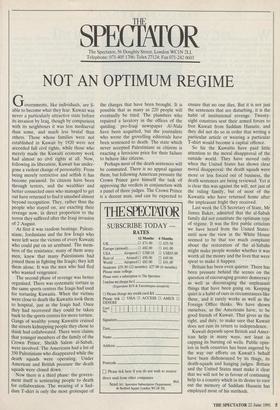T FIE
The Spectator, 56 Doughty Street, London WC1N 2LL Telephone: 071-405 1706; Telex 27124; Fax 071-242 0603
NOT AN OPTIMUM REGIME
Governments, like individuals, are li- able to become what they fear. Kuwait was never a particularly attractive state before its invasion by Iraq, though by comparison with its neighbours it was less mediaeval than some, and much less brutal than others. Those whose families were not established in Kuwait by 1920 were not accorded full civil rights, while those who merely made the Kuwaiti economy work had almost no civil rights at all. Now, following its liberation, Kuwait has under- gone a violent change of personality. From being merely restrictive and selfish it has become paranoid. Its citizens have been through terrors, and the wealthier and better connected ones who managed to get out have returned to find it smashed almost beyond recognition. They, rather than the people who stayed on, are exacting their revenge now, in direct proportion to the terror they suffered after the Iraqi invasion of 2 August.
At first it was random beatings. Palesti- nians, Jordanians and the few Iraqis who were left were the victims of every Kuwaiti who could put on an armband. The mem- bers of the resistance, many of them army men, knew that many Palestinians had joined them in fighting the Iraqis; they left them alone. It was the men who had fled who wanted vengeance.
The second phase of revenge was better organised. There was systematic torture in the same sports centres the Iraqis had used for torturing Kuwaitis. When the victims were close to death the Kuwaitis took them to hospital, just as the Iraqis had. Once they had recovered they could be taken back to the sports centres for more torture. Gangs of wealthy young Kuwaitis cruised the streets kidnapping people they chose to think had collaborated. There were claims that younger members of the family of the Crown Prince, Sheikh Salem al-Sabah, were involved. The Americans had a list of 350 Palestinians who disappeared while the death squads were operating. Under American and British pressure the death squads were closed down.
Now there is a third phase: the govern- ment itself is sentencing people to death for collaboration. The wearing of a Sad- dam T-shirt is only the most grotesque of the charges that have been brought. It is possible that as many as 220 people will eventually be tried. The plumbers who repaired a lavatory in the offices of the quisling, pro-Iraqi newspaper Al-Nida have been acquitted, but the journalists who wrote the grovelling editorials have been sentenced to death. The state which never accepted Palestinians as citizens is exacting a ferocious price for their failure to behave like citizens.
Perhaps most of the death sentences will be commuted. There is no appeal against them, but following American pressure the Crown Prince gave himself the task of approving the verdicts in conjunction with a panel of three judges. The Crown Prince is a decent man, and can be expected to ensure that no one dies. But it is not just the sentences that are disturbing, it is the habit of institutional revenge. Twenty- eight countries sent their armed forces to free Kuwait from Saddam Hussein, and they did not do so in order that writing a particular article or wearing a particular T-shirt would become a capital offence.
So far the Kuwaitis have paid little attention to the moral disapproval of the outside world. They have moved only when the United States has shown clear moral disapproval: the death squads were more or less forced out of business, the death sentences are being reviewed. Yet it is clear this was against the will, not just of the ruling family, but of most of the Kuwaitis who have returned home after the unpleasant fright they received.
Last week the US Secretary of State, Mr James Baker, admitted that the al-Sabah family did not constitute the optimum type of regime. It was the first public criticism we have heard from the United States: until now the view in the White House seemed to be that too much complaint about the restoration of the al-Sabahs might make people wonder whether it was worth all the money and the lives that were spent to make it happen.
Britain has been even quieter. There has been pressure behind the scenes on the question of encouraging greater democracy as well as discouraging the unpleasant things that have been going on. Keeping quiet is a habit of ours in circumstances like these, and it rarely works as well as the Foreign Office thinks. We have shown ourselves, as the Americans have, to be good friends of Kuwait. That gives us the right, and duty, to make sure that Kuwait does not ruin its return to independence.
Kuwait depends upon British and Amer- ican help in many ways, not least in capping its burning oil wells. Public opin- ion in both countries has been angered by the way our efforts on Kuwait's behalf have been dishonoured by its thugs, its death-squads and hanging judges. Britain and the United States must make it clear that we will not be in favour of continuing help to a country which in its desire to root out the memory of Saddam Hussein has employed most of his methods.


























































 Previous page
Previous page